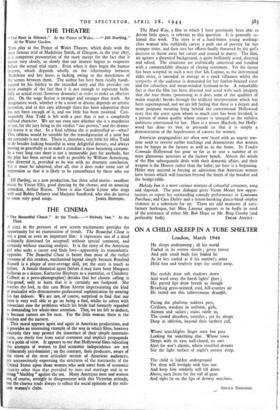THE CINEMA
A LULL in the pressure of new screen excitements provides the opportunity for an examination of trends. The Beautiful Cheat is not a great or even an important film : it represents one of a kind ordinarily dismissed (or accepted) without special comment, and certainly without exacting analysis. It is the story of the American girl who seeks a career and finds love—apparently its transatlantic opposite. The Beautiful Cheat is better than most of the earlier versions of this modern, mechanised legend simply because Rosalind Russell is a player of over-average skill, yet the story is much as before. A female theatrical agent (before it may have been Margaret Sullavan as a doctor, Katharine Hepburn as a journalist, or Claudette Colbert as a press-photographer) decides that her chosen calling is kiss-proof, only to learn that it is certainly not foolproof. She marries the fool, in this case Brian Aherne impersonating the kind of journalist who demonstrates professional sophistication by wearing his hat indoors. We are not, of course, surprised to find that our hero is very well able to go on being a fool, whilst he solves with insouciant ease the problems which his bride had formerly regarded as demanding her whole-time attention. This, we are left to deduce, is because careers are for men. For the little woman there is the kitchen and the nursery.
This moral appears again and again in American productions, and it provides an interesting example of the way in which films, however sincerely they may protect the innocence of their simple entertain- ment, are rarely free from social comment and implicit propaganda for a point of view. It appears to me that Hollywood films ridiculing the attempts of women to find economic independence are not deliberately anti-feminist ; on the contrary, their producers, aware of the views of the most articulate section of American audiences, are unconsciously expressing the strictures of the matriarchs of the United States upon those women who seek some form of economic security other than that provided by men and marriage and in so doing " blackleg " against the sex. Many American men and women are, of course, strongly in disagreement with this Victorian attitude, but the cinema tends always to reflect the social opinions of the mili- tant women's clubs. The Hard Way, a film to which I have previously been able to devote little space, is relevant to this question. It is generally re- leased this week. The story is of a hard-bitten young working- class woman who ruthlessly carves a path out of poverty for her younger sister, and then sees her efforts finally thwarted by the girl's decision to throw away her career and instead to marry. The film, set against a theatrical background, is quite brilliantly acted, directed and edited. The situations are realistically conceived and handled with a commendable absence of cloying sentiment. Yet the theme has been scripted in such a way that Ida Lupino, as the determined elder sister, is intended to emerge as a stock villainess whilst the sympathy of the audience is demanded for her feather-brained sister and the colourless and mean-minded husband-to-be. A remarkable fact is that the film has been directed and acted with such integrity that the true theme (possessing as it does some of the qualities of major tragedy) breaks through the artificial interpretation which has been superimposed, and we are left feeling that there is a deeper and more poignant meaning lying behind the conventional Hollywood story that the sister upon whom so much care has been lavished, is a person of minor quality whose stature is unequal to the ruthless ambitions entertained for her. Here is a minor Macbeth, but Holly- wood has done its beat to persuade us that it is simply a demonstration of the hopelessness of careers for women.
American propagandists are often now faced with an urgent war- time need to reverse earlier teachings and demonstrate that women may be happy in the factory as well as in the home. In Tender Comrade Hollywood has gone so far as to scat a number of its most glamorous actresses at the factory bench. Almost the whole of the film subsequently deals with their domestic affairs, and their weapon is the Hoover rather than the lathe; yet here is a beginning. Hitler may succeed in forcing an admission that American women have brains which will function beyond the limits of the boudoir and the bridge-table.
Melody Inn is a most curious mixture of colourful costumes, song and slapstick. The poor dialogue gives Victor Moore few oppor- tunities to repeat his outstanding comedy performance in Louisiana Purchase, and Cass Dailey and a house-breaking dance-band employ violence as a substitute for art. There are odd moments of satis- factory burlesque, but Miss Lamour appears to be badly in need of the assistance of either Mr. Bob Hope or Mr. Bing Crosby (and


























 Previous page
Previous page